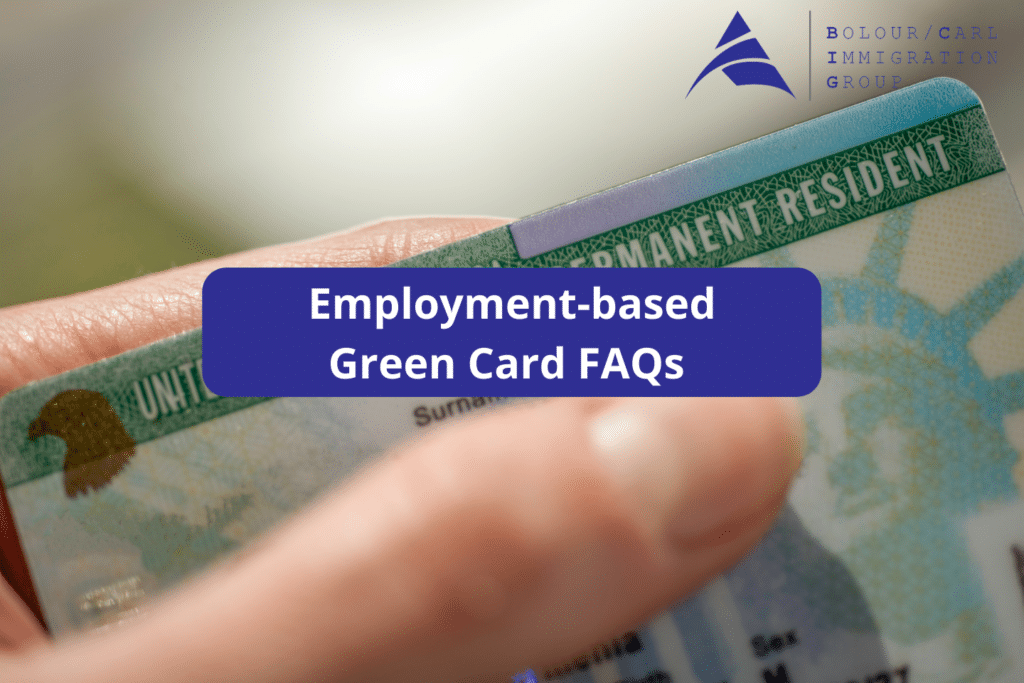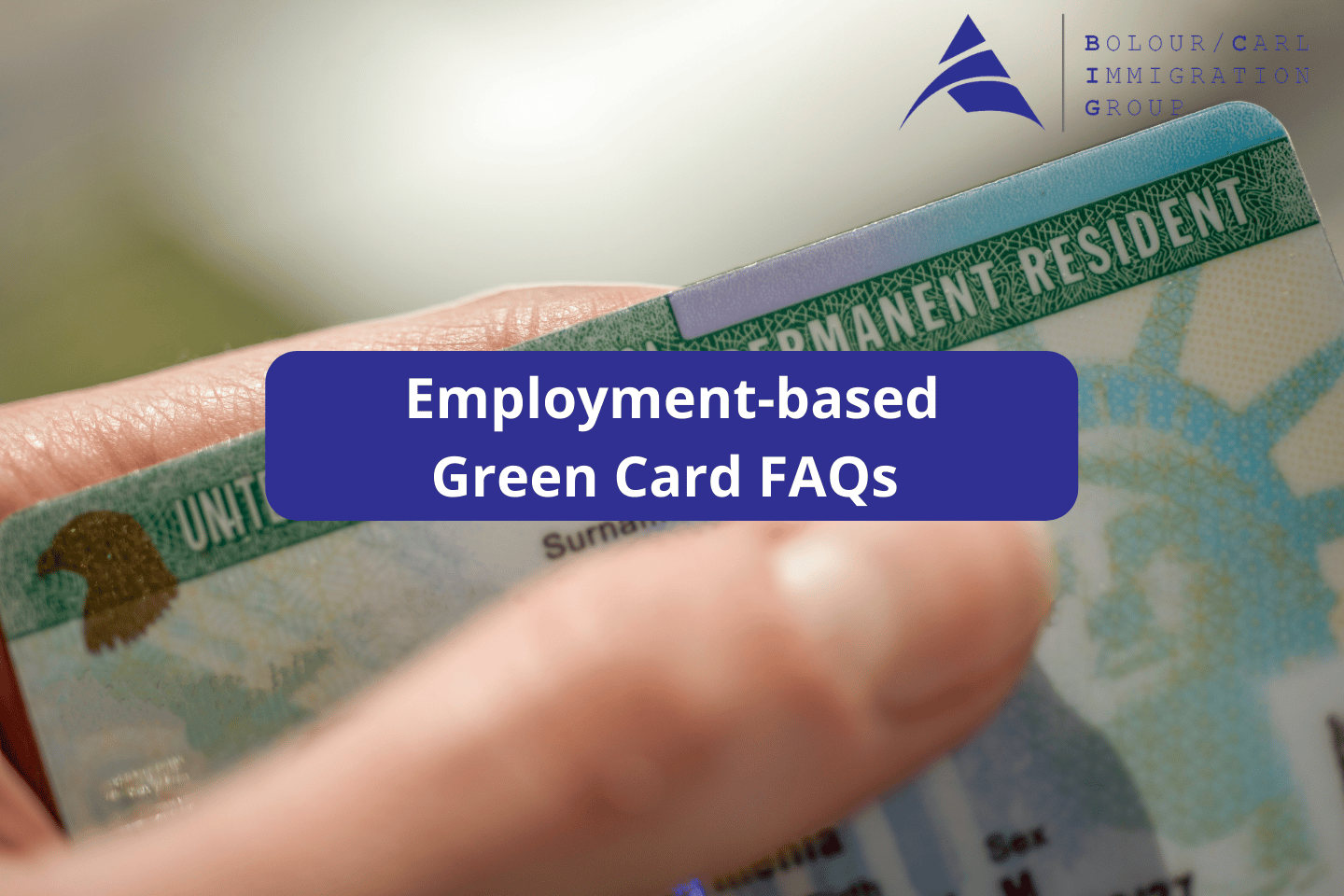
An employment-based green card is an excellent solution for many foreign nationals who wish to live and work in the United States and for U.S. employers who wish to employ them. However, applying for an employment-based green card is a complex, multi-step process. Below are answers to some frequently asked questions.
Which category of employment-based green cards is best for me?
The three most common employment-based green card categories are first preference (EB-1), second preference (EB-2) and third preference (EB-3). The first-preference category is reserved for immigrants who can demonstrate they have extraordinary ability in their field as well as outstanding professors and researchers and certain multinational executives and managers. EB-2 is for immigrants who work in professions requiring advanced degrees, who have exceptional ability, or who qualify for a national interest waiver because their employment in the United States would greatly benefit the nation. The EB-3 category is the most inclusive. It’s open to professionals whose jobs require at least a U.S. bachelor’s degree or the foreign equivalent; skilled workers, whose jobs require at least two years of training or experience (which may include relevant education); and other workers with less than two years of relevant experience, training or education. These visas are not for temporary, seasonal positions.
The qualifications for EB-1 are more stringent than for EB-2, and likewise with EB-2 versus EB-3. But there is some overlap between the categories, so many people may qualify under more than one category. However, by applying for a visa in the highest-preference category for which you are eligible, you will likely get your work visa more quickly.
What is the first step in applying for an employment-based visa?
That depends on the preference category and subcategory within each one. People who are applying for an EB-1 visa based on their extraordinary ability or those who are applying for an EB-2 visa because they have a national interest waiver can self-petition using Form I-140, Petition for Alien Worker with U.S. Citizenship and Immigration Services (USCIS).
Outstanding professors/researchers and multinational managers/executives who are applying for an EB-1 visa and most people applying for employment-based green cards in other preference categories will need to be sponsored by a U.S. employer, who must file Form I-140 on the worker’s behalf.
For most EB-2 and EB-3 workers, employers must first go through the PERM process to receive permanent labor certification from the U.S. Department of Labor (DOL). This document will verify that there are no U.S. workers who are willing, able, qualified and available to accept the job at the prevailing wage for that occupation, level and geographic area, and that by hiring a foreign worker, the employer will not adversely impact the job opportunities, wages and working conditions of U.S. workers.
Once the DOL approves the PERM application, the employer’s next step is to file Form I-140 with USCIS.
If Form I-140 is approved, what comes next?
Workers who are already lawfully in the United States in another status must file Form I-485, Application to Register Permanent Residence or Adjust Status; this application can be done concurrently with the employer’s filing of Form I-140 as long as there is a visa available. Workers who are outside the United States must go through a consular process in their country to apply for their green card.
How long does it take to get an employment-based green card?
The PERM labor certification process typically takes about eight to 11 months from start to DOL approval. It then takes about six months to process an I-140 petition. Applicants must wait for their priority date, which varies depending on preference category and country of origin, to become current. Although this often happens within a matter of months, it can take several years in some cases. Once a priority date is current, the adjustment of status process takes about four to six months, while consular processing may take weeks or months depending on many factors.
In many cases it’s possible to expedite the 1-140 processing time to 15 days by paying a fee for premium processing. However, if your priority date will not be current for some time, the expedited processing won’t matter because you cannot adjust your status or go through consular processing until your priority date is current.
How do I know what my priority date is?
When your I-140 is filed on your behalf, you will receive Form I-797, Notice of Action. Your priority date will be listed on this form. You can periodically check your place in the visa queue using the Visa Bulletin, which provides the most recent date for when a visa number is available for the different categories and countries.
Can I stay in the U.S. while my employment-based green card application is pending?
If you are in the U.S. in a valid nonimmigrant status, such as H-1B, O-1, J-1 or other, you can remain in the country while your green card application is being processed, provided your nonimmigrant status does not expire. Once your I-485 form is filed, you can stay in the U.S. until it is adjudicated.
Can my family members apply for green cards?
Yes, the spouse and unmarried children under age 21 of an employment-based green card applicant can apply for a green card as a derivative applicant.
Should I work with an attorney, or can I file for an employment-based green card myself?
For both employers and immigrants, the employment-based green card process is highly complex, and missteps at any juncture can lead to delays or an application being denied. It is advisable that you work with an experienced immigration attorney on each step of the application process, from determining which visa is best given your circumstances to ensuring the timely and proper submission of all applications and supplementary documents and evidence.
To speak to an employment-based visa lawyer about employment-based green cards or other work visa programs, contact Bolour/Carl Immigration Group at 323-857-0034 or [email protected].


